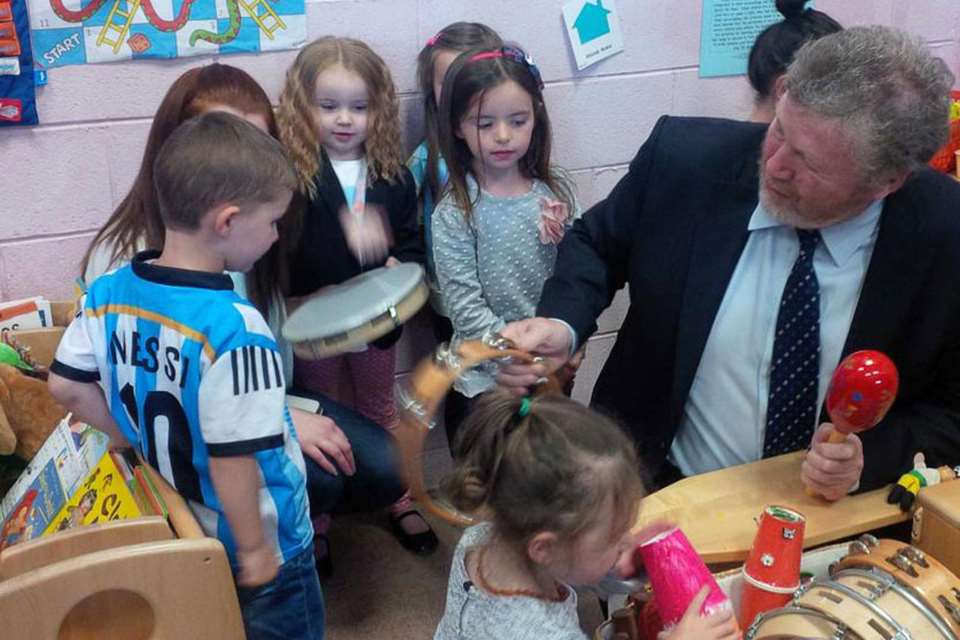Childcare providers call for relaxation of qualifications to tackle staffing 'crisis'
Thursday, October 19, 2017
An organisation of independent childcare providers in Ireland is calling for a temporary relaxation of the rules that all childcare staff be qualified to alleviate the sector ‘recruitment crisis’.

In its policy document, published this month, Seas Suas - a new national membership organisation representing independent early education and childcare providers - calls on the Government to relax for three years, the requirement from 100 per cent qualified staff to 75 per cent in a childcare setting, pending the introduction of a national apprenticeship scheme.
As of 31 December 2016, all staff working directly with children in Ireland must hold a minimum of a QQI Level 5 Major Award in Early Childhood Care and Education (FETAC) - equivalent to an NVQ Level 3.
While the organisation says it supports the developments towards formalising education and professionalising the sector, the ‘rigidity’ of the 100 per cent qualification is exacerbating a staffing crisis that is already crippling early childhood and care (EEC) providers.
According to Seas Suas, the Level 5 qualification requirement is currently shutting out from employment a pool of people who are often very well-qualified, with significant on-the-job experience, but who may not have a formal qualification.
It goes on to say that it strongly believes a mix of skills and experience is an essential part of the skillset needed to care for and educate children, and recommends a National Apprenticeship scheme be set up.
Seas Saus says the introduction of an apprenticeship scheme would help alleviate the staffing crisis, as well as improve the training and education process for EEC staff.
The organisation recommends that the apprenticeship be based on the existing Irish Solas apprenticeship model, and consist of a work/study programme under which staff receive on-the-job training, potentially leading to a placement with the EEC provider on completion of the programme.
Within its policy document, Seas Saus sets out its ten point plan, which includes:
- a Government commitment to subvention of staff salaries as part of wider initiatives to improve wages for childcare staff;
- speeding up the Garda vetting process. Seas Suas says with the staffing crisis in the sector, delays of up to three months are making it impossible to maintain staff and ensure ratios are adhered to;
- abolishing commercial rates on settings and change the VAT status to zero so providers can reclaim VAT on relevant purchases;
- stablishing a dedicated EEC Consultation Group that is fully representative of all providers and ensures that they are at the heart of all policy decisions which impact the sector;
- allow for greater flexibility on the toddler sleep and rest requirements. Specifically, reverse inspectorate Tulsa’s requirement that children between 16 and 24 months must sleep in cots. Seas Suas says this requirement is impacting on settings' capacity by reducing available space by as much as 20 per cent.
Regina Bushell, chairperson of Seas Suas (pictured) said, 'Seas Suas has formed because independent providers of early education and childcare nationwide are deeply concerned by the lack of a long term plan for early education and childcare in Ireland.
'Over the last few years, the government has introduced a number of new schemes aimed at improving the early years sector. But, as our policy document sets out, without proper consultation and investment, these changes are not improving the situation for providers and employees working in the sector. If anything, they are making early education and childcare increasingly unsustainable. We need fresh ideas and new energy to constructively work with the government towards improving the sector for everyone who works in and benefits from early education and childcare.
'Our ten point plan provides a pathway to increasing investment and removing financial burdens; tackling the recruitment crisis and supporting employees on career pathways in the sector; streamlining the inspection process and alleviating the red tape and paperwork that’s eating up time better spent with the children in our care.'
Ireland’s Budget 2018
Publication of the report came ahead of the Irish Budget 2018 last week (10 October), which included the announcement of a 7 per cent increase in funding for providers to deliver the ECEC scheme, or free pre-school, as it has become known.
Under the ECEC scheme, all children in Ireland from the age of three until they start school, are entitled to 15 hours of free childcare a week over 38 weeks of the year. As announced in the Budget this will increase to 61 weeks of the year from September 2018.
Katherine Zappone TD, minister for children and youth affairs, said, ‘The wages in the early years sector are low and do not support the recruitment and retention of high quality staff. I hope the increase in capitation I am announcing today will assist employers to improve conditions for their staff. I am aware it is not something that can be sorted overnight but I believe it is a step in the right direction. The Independent Review of the Cost of delivering Quality Childcare, which I have commissioned, will assist me in seeking more investment for childcare providers over the coming years if this is independently proven to be required.’
Other measures announced in Budget 2018 include additional funding to ensure providers are paid for the administration associated with Government childcare schemes and further investment to enhance the early years inspection regime.
Regina Bushell added, 'Budget 2018’s increase in the ECCE capitation is welcome but it’s not nearly enough. We need to substantially increase investment in early years to at least 1 per cent of GDP if we are to catch up with the rest of Europe. Seas Suas also wants to ensure that the changes to the ECCE scheme, due to come into effect in September 2018, happen smoothly and without preventable problems. We’re meeting with the Department of Children and Youth Affairs this week and will be raising the Budget changes with officials, as well as the need for greater long term investment in the sector and a consultative group to improve communication between the Department, its regulatory agencies, and providers on the ground.'
Nursery World asked the Department of Children and Youth Affairs for a comment.








